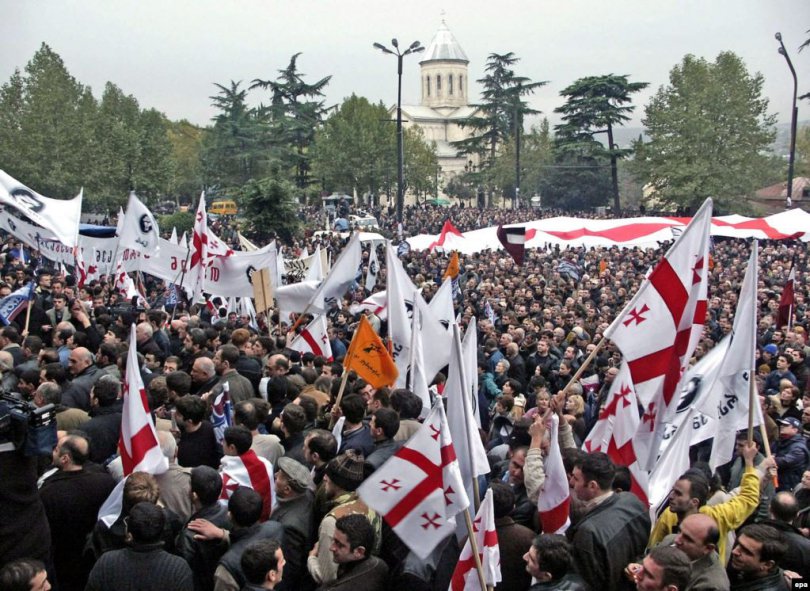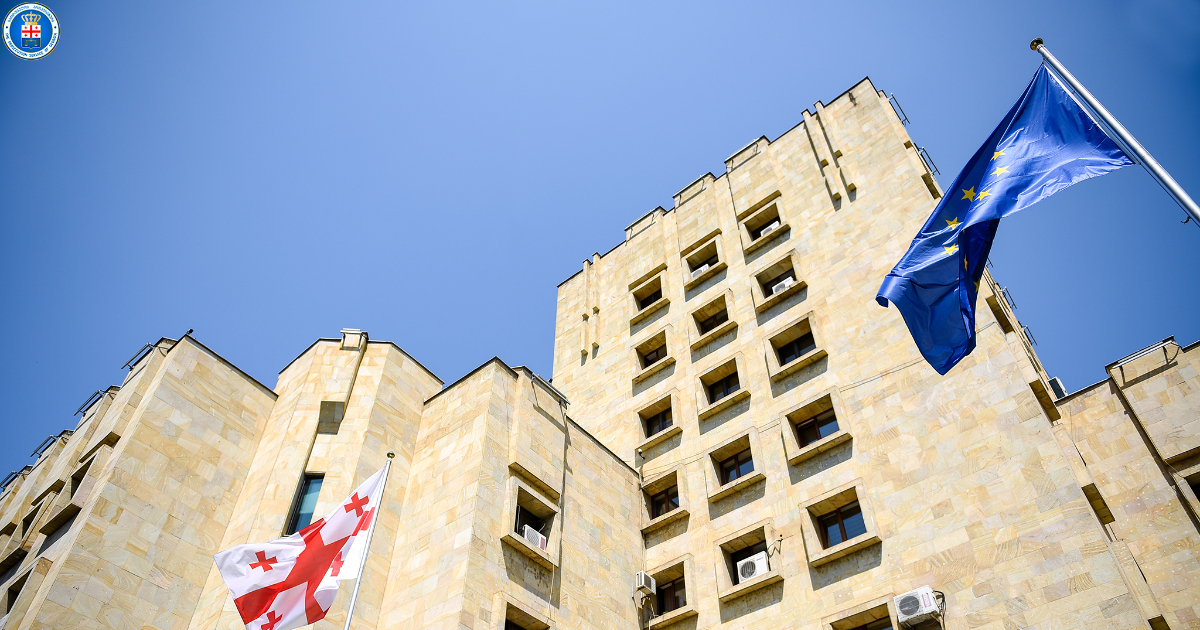20 years since Rose Revolution in Georgia

Author
Front News Georgia
Twenty years have passed since the bloodless 2003 Rose Revolution in Georgia, overthrowing the presidency and rule of Eduard Shevardnadze by Mikheil Saakashvili and his United National Movement.
Enraged by the falsification of the Parliamentary elections on November 2, 2003, people took to the streets and confronted Shevardnadze’s Government, with the protests lasting three weeks and culminating on November 23, 2003 with revolution and the resignation of the President.
The power of Shevardnadze was significantly weakened by that time. The Union of Citizens, the ruling party that won the Parliamentary elections in 1999, began to disintegrate in 2000 and was defeated in the 2002 municipal race.
The Labor Party and the UNM won the elections in Tbilisi, and Memarjveneebi ( Rightists) gained victory in other constituencies. All three opposition parties claimed victory in the 2003 Parliamentary elections. The UNM participated in the 2003 race under the name Saakashvili – National Movement.
Another important opposition bloc was created by Zurab Zhvania, the currently deceased former Prime Minister, although his party United Democrats was defeated in the 2002 municipal elections . However, he managed to form a bloc with the Union of Traditionalists of Georgia led by Akaki Asatiani and Nino Burjanadze, a popular politician at that time, the former chairwoman of the Parliament of Georgia, at the beginning of 2003, which participated in the elections under the name Burjanadze – Democrats.
The Union of Citizens tried to strengthen its position in early 2003 and formed an alliance for New Georgia, which was joined by the National Democratic Party and the Socialist Party. The Union of Democratic Revival, representing the ruling power in the Autonomous Republic of Adjara and traditionally enjoyed high support among the public, also participated in the elections.
The significance of the elections was increased by the upcoming presidential polls, which, according to the Constitution of Georgia, were to be held in the spring of 2005 and in which Shevardnadze would no longer be able to participate. The leader of the victorious force in the Parliamentary elections created an important springboard in the fight for the presidency. Saakashvili, Zhvania and Natelashvili had expressed their desire to become president in 2003.
Parliamentary elections were held on November 2, 2003. The same night, the UNM celebrated its victory in the Griboedov Theater Hall. They relied on the results of exit polls, according to which the party came first with 20.8 percent of the vote.
The exit polls said For New Georgia came second with 12.9 percent and the Labor Party third with 12.8 percent, while the official data by the country’s Central Election Commission was not published. The CEC only published the primary data at three o’clock in the morning, with the Governmental bloc and the UNM in leading positions, but the overall picture remained unclear. The International Society for Fair Elections and Democracy – a domestic election watchdog, published its data of the parallel vote count the next day On November 3, the results of the parallel counting of votes, which was published by the organization ISFED, were published, which said five election subjects had ovecrome a seven percent election threshold.
Saakashvili – National Movement – 26.26%
For New Georgia – 18.92%
Labor Party of Georgia – 17.36%
Burjanadze-Democrats – 10.15%
Union of Democratic Revival – 8.13%
Akhali Memarjveneebi (New Rightists) – 7.99%
The CEC had counted one-sixth of the votes by that time, and said the Government bloc (27.6%) and the UNM (23%) were in the lead. On the same day, the data of observing organizations, including the OSCE, over violations became known. The exception was the CIS observers, which according to the preliminary assessments, called the elections fair and democratic.The Burjanadze-Zhvania block recognized the victory of the UNM in the race, while the latter raised the issue of rallies.
The first demonstration was held on November 4. Only the Democrats responded to the televised appeal of the UNM. The Supporters of the Democrats gathered at the Philharmonic concert hall in central Tbilisi and later joined the supporters of the UNM who gathered at the City Hall building. Konstantine Kemularia demanded the annulment of the results in the electoral districts of Adjara during the rally. Later, this demand became one of the main demands of the opposition.
The Akhlebi, who did not participate in the demonstration, said that they did not approve the televised invitation, on the other hand, they accused the UNM of complicity in rigging the elections. The opposition called the demonstration a “warning walk”. They presented the Government with an ultimatum to recognize the victory of the opposition by 12:00 on November 5, otherwise they promised to continue the rally at the Government office the next day.
From the same day, a special forces unit and internal army units appeared in the city, which were concentrated near the Government headquarters and the CEC. Shevardnadze called the opposition to dialogue. Later the same day, the Minister of Internal Affairs had warned of the potential use of force to disperse demonstrators.
The UNM and Democrats, who labeled themselves as the United Front of Resistance, held a demonstration on November 5, with key demands formulated – the annulment of the election results in Marneuli, Bolnisi, Tkibuli, Batumi, Kobuleti and overseas constituencies. In addition, the opposition demanded the release of the detained 21-year-old observer in Kobuleti and the removal of all governors and police chiefs from their positions. The opposition gave the Government time until November 7 to fulfill the demands. The Labor Party and the Union of Democratic Revival condemned the rallies.
In the same evening, according to CEC data, the bloc for New Georgia was in the lead with 298,000 votes, and the UNM was in second place with 265,000 votes. The CEC data was drastically changed by the results from the electoral districts of Adjara on the evening of November 6. According to these data, the Union of Democratic Revival in Adjara won first place with 95 percent of the vote. It received 270,000 votes out of 284,000 votes and moved to first place throughout Georgia. The ruling bloc and the UNM came second and third. After the announcement of the results, Saakashvili called people to rallies – on November 7 in the regions, and on November 8 in Tbilisi.
At the same time, Burjanadze voiced the bloc’s decision to give up parliamentary mandates. The decision further aggravated the situation. The representatives of the UNM who were holding a rally in Zugdidi were opened fire by unknown persons. Saakashvili accused Shevardnadze and the Minister of Internal Affairs of organizing the provocation, while the President called the opposition to dialogue again.
A mass protest was held in Tbilisi’s Freedom Square on November 8, where about 20,000 protesters gathered, demanding the resignation of the President and the Interior Minister.
Later, the protesters moved to the Government office and the Parliament of Georgia. The action continued at night. The police had blocked the entrance roads to Tbilisi by that time.
Shevardnadze suddenly came to the rally on November 9 to hold talks with the people, but in vain. On the same evening, negotiations were held between Shevardnadze and the leaders of the protests – Zhvania, Saakashvili, Burjanadze – at the Krtsanisi residence. The meeting ended without results. Saakashvili was the first to leave it and called for larger demonstrations.
The action in front of the Parliament of Georgia has taken on a permanent form since November 9. Rallies started in Zestaponi, Telavi and Ozurgeti, and some oppositionists went on hunger strikes.
Akhali Memarjveneebi did not join the protests, and announced they would not participate in the revolution. At the same time, Shevardnadze arrived in Samegrelo and Adjara regions in western Georgia, where he received a promise of support from Aslan Abashidze, the head of the Adjara Autonomous Republic.
The authorities partially made concessions, when on November 11, the district court annulled the results of the elections in Bolnisi based on the claim of the UNM. Shevardnadze once again called the opposition to dialogue, Saakashvili met with State Minister Avtandil Jorbenadze on the same day and demanded the resignation of the Minister of Internal Affairs.
Representatives of the Governmental bloc Vakhtang Rcheulishvili and Gia Karkarashvili expressed their readiness for compromise, which should have been expressed by acknowledging the victory of the UNM. A meeting between the President, opposition leaders and the chairman of the CEC was planned at the Government office on November 12, which did not take place because the opposition leaders did not appear.
Saakashvili announced he was no longer going to negotiate with the Government the next day and the resignation of the President became the only and unconditional demand of the rallies. The opposition started collecting signatures for the goal.
The opposition held another mass rally on November 14. Protesters formed a human chain around the Government office. The opposition leaders declared civil disobedience to the Government. On November 16, in the concert hall of the Philharmonic, the opposition formed a disobedience committee and developed a five-point appeal to the public, urging them to block the buildings of local administrations, strike civil servants, and entrepreneurs – to non-payment of taxes. The opposition also called on drivers to stop their cars and sound their horns in defiance during the President’s radio interview on Monday at 11:00.
Demanding Shevardnadze’s resignation, hunger strikes began in Zugdidi and Telavi, which resulted in the resignation of Shevardnadze’s ally, Telavi Governor Medea Mezvrishvili. Protest actions were held in Rustavi, Akhaltsikhe, Poti. Teachers’ strike was held in Abasha, and doctors’ strike was held in Zugdidi. On November 19, a rally was held in Bolnisi, where the protesters were attacked by representatives of the local government. On November 13-17, protests were held in Hamburg, London and New York. The students of Tbilisi State University also joined the civil disobedience.
Shevardnadze once again called the opposition to dialogue. After that, on November 17, pro-Government rallies began in front of the Parliament of Georgia. Supporters of the Union of Democratic Revival, Zviad Gamsakhurdia’s [the first President of Georgia] widow, Manana Archvadze, and the Union of Citizens, participated in the action. They accused the UNM of inciting civil confrontation.
CEC published the final official results of the elections on November 20:For New Georgia – 21.32%Union of Democratic Revival – 18.84%Saakashvili – National Movement – 18.8%Labor Party of Georgia – 12.04% Burjanadze-Democrats – 8.79% New Rightists – 7.35%
ISFED was dissatisfied with the results, while the US State Department said the results did not reflect the will of the Georgian people. Nevertheless, Shevardnadze scheduled the first session of the Parliament on November 22.
The opposition parties organizing the protests pushed their supporters from the regions to Tbilisi the previous day. The Tsalenjikha bus from western Georgia with Saakashvili in, led the motorcade.
The supporters of the opposition entered Tbilisi on November 21 and stopped at Freedom Square, because the rally of supporters of the Government was still being held in front of the legislative body. The opposition announced the beginning of the Velvet Revolution.The Labor Party announced a boycott of the Parliament, but did not join the demand for Shevardnadze’s resignation and the protests.
At the first session of the Parliament on November 22, when Shevardnadze was giving his welcome speech, protesters led by Saakashvili broke into the session hall. Shevardnadze left the hall accompanied by security. MPs who appeared at the session left the hall, as well as pro-Government protesters from the surrounding area of the Parliament. The opposition supporters occupied the building instead. Later they also occupied the Government office. The police did not prevent the protesters from occupying the facilities.
Shevardnadze, who was in the residence of Krtsanisi, declared a state of emergency. Saakashvili called on the protesters to occupy the buildings of the Ministry of Internal Affairs and the state television. At the same time, Saakashvili again demanded Shevardnadze’s resignation, otherwise he threatened to continue the actions at the Krtsanisi residence.
On November 23, at 8:00 p.m., a meeting between Shevardnadze and the opposition leaders was held with the mediation of Russian Foreign Minister Igor Ivanov. After the meeting, Shevardnadze announced his resignation. The resignation of the President was followed by the resignation of other officials, including the Minister of Internal Affairs.
On November 24, Saakashvili announced the termination of the civil disobedience campaign, and Acting President Burjanadze canceled the state of emergency introduced on November 22.
The Rose Revolution changed the 11-year rule of Shevardnadze and his team in Georgia.It brought unprecedented popularity to Saakashvili and turned him into the virtually undefeatable leader of the early presidential elections. Saakashvili won the elections on January 4, 2004, and the UNM received the absolute majority of votes in the parliamentary elections held on March 28.
The Rose Revolution significantly undermined Abashidze’s rule in the Autonomous Republic of Adjara. He was able to maintain his power for only a few months.
The Rose Revolution increased the popularity of the UNM, as well as the Burjanadze and Zhvania bloc. After the revolution, the rating of other political parties, especially the Labor Party of Georgia and the New Rightists dropped sharply. They experienced a 15-17 percent decline in votes after the revolution.
The Rose Revolution influenced the internal political conflicts in other post-Soviet countries. It was followed by the Orange Revolution in 2004 in Ukraine and the Tulip Revolution in 2005 in Kyrgyzstan.
Tags:





